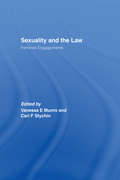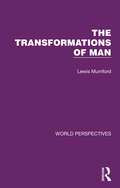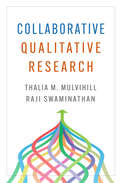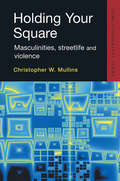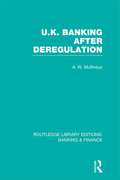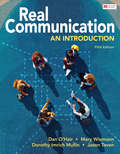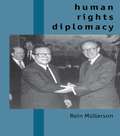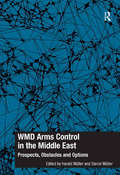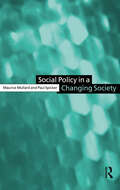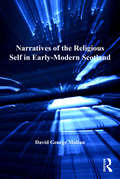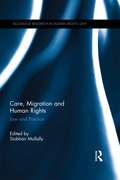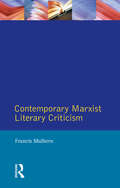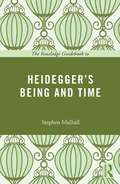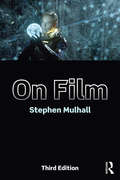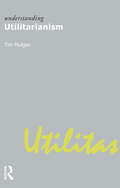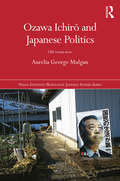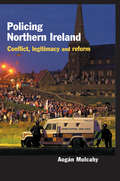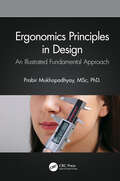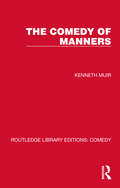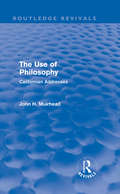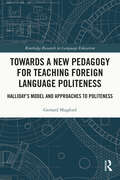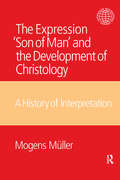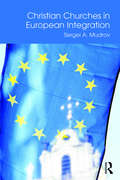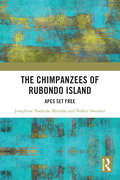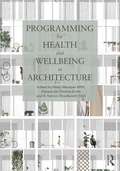Special Collections
Benetech’s Global Certified Accessible Titles
Description: Benetech’s GCA program is the first independent third-party EPUB certification to verify ebook accessibility. By creating content that is born accessible, publishers can meet the needs of all readers. Learn more: https://bornaccessible.benetech.org/
- Table View
- List View
Sexuality and the Law
by Vanessa E Munro and Carl F Stychin‘Rediscovering’ the peculiarity of feminist perspectives, rather than examining the broader range of gender-oriented analyses, in the area of legal regulation and sexuality, this edited collection avoids the ‘reductionist' and 'essentialist' shortcomings of ‘feminism unmodified’. With a substantial introductory chapter, written by the editors, summarizing the state of the law on core aspects of sexuality and providing a critical appraisal of the key themes and concerns, it analyzes and transcends the traditional dichotomised thinking (e.g coercion/choice, victim/agent) about the regulation of gender issues. It addresses a broad range of key themes including: crime the family and child contract law jurisprudence public and international law. Offering a space in which to re-vitalize a feminist conception of sexuality, this book is an essential read for law students interested in the legal implications of gender and sexuality.
The Transformations of Man
by Lewis MumfordOriginally published in 1957, this volume compares the 20th Century transformation of human life to the revolution which swept early man into the first civilized communities. It shows how each radical new stage of human development grew out of changes in human personality and consciousness, such as the invention of language and symbols, the origins of universal religions and the mechanization of everyday life. Despite the threat that the author foresees from an over-reliance on automation, the book maintains that humanity still has the means, spiritual, personal and technological to create a sustainable future for itself, by increasing the usefulness and freedom of all men.
Collaborative Qualitative Research
by Raji Swaminathan and Thalia M. MulvihillMeeting a key need for qualitative researchers, this practical book presents tools for creating productive partnerships and managing each phase of a collaborative project. The authors provide guidelines for working across disciplines, status differentials (such as professor and student), and geographical locations. Collaboration within particular qualitative traditions--cross-cultural research, duoethnography, participatory action research, arts-based collaborations, and others--is described and illustrated with exemplars of published studies. Readers learn how to build research teams, formulate research questions, gather and analyze data, and assess how collaborations are working. Ethical questions are highlighted throughout: Who owns collaborative research? Who decides what aspects of the findings should be disseminated? How can inequitable power relations be redressed? Within-chapter "Pedagogical Pathways" sections provide practice exercises and opportunities for reflection.
Holding Your Square
by Christopher MullinsThis book is about the meanings of masculinities within the social networks of the streets of an American city (St Louis, Missouri), and how these shaped perceptions and enactments of violence. Based on a large number of interviews with offenders the author provides a rich description of life on the streets, contextualizing criminal violence within this deviant subculture, and with a specific focus on issues of gender. The book provides one of the most detailed descriptions yet of the forms masculinity takes in disadvantages communities in the United States. It establishes how street based gender identity motivated and guided men through violent encounters, exploring how men's relationships with women and their families instigated violence. One key issue addressed is why men resorted to violence in certain situations and not in others, exploring the range of choices open to them and how these opportunities were interpreted. The book makes a major contribution to the study of the relationship between masculinities and violence, making use of a much larger sample than elsewhere.
UK Banking After Deregulation
by Andy MullineuxHow does financial deregulation affect the operation of the banking system in the UK? What are the consequences of the development of an electronic banking system? This book addresses these and other important questions in a survey of UK change in the financial sector and in banking in particular. Attention is given to the role of building societies after the ‘big bang’ and the implications for retail banking of competition in the housing finance market. Both the long and short term implications of regulatory reform for banks are dealt with together with the role of the Bank of England and what the changes have meant in terms of international banking. Concentrating on the three main areas of change deregulation, regulatory reform and technical innovation the book is an important pointer to the shape of banking in the late 1980s and early 1990s.
Real Communication
by Dan O'Hair and Mary Wiemann and Dorothy Imrich Mullin and Jason TevenReal Communication continues to prove its reputation as the most current human communication text available. This new edition provides today�s students with the critical skills they now need most: to be able to objectively encounter increasingly digital communication contexts, examine the theory and concepts underpinning them, and competently respond in a professional, healthy, and intentional way. Utilizing a social-scientific approach to communication, the text uses engaging stories which work as small case studies that students learn to see and analyze as communication situations, discovering theory played out in practice. Authored by a leading team of communication scholars and instructors, this authoritative text helps students become social scientists in communication to confront and adapt to the challenges of today�s digital age.
Human Rights Diplomacy
by Rein MullersonIn this insightful analysis of human rights diplomacy Rein Mullerson examines the way foreign policy instruments are used to promote human rights abroad as well as how human rights issues are used for the sake of other foreign policy aims.The book explores the relationship between human rights and international stability, the role of non-governmental organisations, the business community and mass media in formulating human rights agendas for governments and inter-governmental organisations. Also addressed are issues such as the universality of human rights in a multi-cultural world and the impact of religious and nationalistic extremism. Rein Mullerson concludes by looking at the role of the UN and other international bodies engaged in the promotion of human rights and how military force can be an option in settling violationsThe author argues that it tends to be regimes that are hostile to human rights which in turn cause instability in the international community. Throughout the work it is demonstrated that a concern for human rights is legitimate because of the impact they have on international relations and because of the common bonds that link all people.
WMD Arms Control in the Middle East
by Harald MüllerThe Middle East is a hot spot of proliferation. It contains one state assumed to possess nuclear weapons, several states that tried and failed to develop a military nuclear capability, one state under suspicion of trying to do so, and it is the world region that witnessed the most frequent and severe employment of chemical weapons since the end of World War I. Notwithstanding, not a single arms control regime concerning weapons of mass destruction (WMD) covers the region as a whole. Instead we have seen several proliferation-related military operations which have rather contributed to destabilization than served non-proliferation. This volume, written under the auspices of the EU Consortium for Non-Proliferation and Disarmament determines the current state of diplomatic efforts to establish a WMD free zone in the Middle East. In doing so, it provides insights into central actors’ conflicting political positions, thereby explaining the stalemate of efforts to negotiate a WMD-free zone. Chapters written by renowned experts from academia and policy-oriented think tanks, as well as by next-generation Middle East and arms control experts, introduce the subject to the reader, give background information about arms control initiatives, provide technical expertise, and endeavour to make proposals for arms control measures in support of the creation of a Middle East WMD-free zone.
Social Policy in a Changing Society
by Paul Spicker and Maurice MullardSocial Policy in a Changing Society is a critical guide to theories about society, exploring the links between social theory and social policy. It considers a range of interpretations of changes in society, politics and the economy, and assesses their practical implications for social welfare. Social Policy in a Changing Society will be essential reading for undergraduates studying social policy and sociology.
Narratives of the Religious Self in Early-Modern Scotland
by David George MullanDrawing on a rich, yet untapped, source of Scottish autobiographical writing, this book provides a fascinating insight into the nature and extent of early-modern religious narratives. Over 80 such personal documents, including diaries and autobiographies, manuscript and published, clerical and lay, feminine and masculine, are examined and placed both within the context of seventeenth-century Scotland, and also early-modern narratives produced elsewhere. In addition to the focus on narrative, the study also revolves around the notion of conversion, which, while a concept known in many times and places, is not universal in its meaning, but must be understood within the peculiarities of a specific context and the needs of writers located in a specific tradition, here, Puritanism and evangelical Presbyterianism. These conversions and the narratives which provide a means of articulation draw deeply from the Bible, including the Psalms and the Song of Solomon. The context must also include an appreciation of the political history, especially during the religious persecutions under Charles II and James VII, and later the changing and unstable conditions experienced after the arrival of William and Mary on her father's throne. Another crucial context in shaping these narratives was the form of religious discourse manifested in sermons and other works of divinity and the work seeks to investigate relations between ministers and their listeners. Through careful analysis of these narratives, viewing them both as individual documents and as part of a wider genre, a fuller picture of seventeenth-century life can be drawn, especially in the context of the family and personal development. Thus the book may be of interest to students in a variety of areas of study, including literary, historical, and theological contexts. It provides for a greater understanding of the motivations behind such personal expressions of early-modern religious faith, whose echoes can still be heard today.
Care, Migration and Human Rights
by Siobhán MullallyThe continuum of exploitation that has historically defined the everyday of domestic work - exclusion from employment and social security standards and precarious migration status – has frequently been neglected. It is primarily the moments of crisis, incidents of human trafficking, slavery or forced labour, that have captured the attention of human rights law. Only recently has human rights law has begun to address the structured inequalities and exclusions that define the domain of domestic work. This book addresses the specific position of domestic workers in the context of evolving human rights norms. Drawing upon a broad range of case studies, this book presents a thorough examination of key issues such as the commodification of care, the impact of the jurisprudence of the Court of Justice of the European Union and the European Court of Human Rights on ‘primary care providers’, as well as the effect that trends in migration law have on migrant domestic workers. This volume will be of interest to lawyers, academics and policy makers in the fields of human rights, migration, and gender studies.
Contemporary Marxist Literary Criticism
by Francis MulhernMarxism has had an enormous impact on literary and cultural studies, and all those interested in the field need to be aware of its achievements. This collection presents the very best of recent Marxist literary criticism in one single volume. An international group of contributors provide an introduction to the development, current trends and evolution of the subject. They include such notable Marxist critics as Tony Bennett, Terry Eagleton, Edward W. Said, Raymond Williams and Fredric Jameson. A diverse range of subjects are analysed such as James Bond, Brecht, Jane Austen and the modern history of the aesthetic.
The Routledge Guidebook to Heidegger's Being and Time
by Stephen MulhallThe Routledge Guidebook to Heidegger’s Being and Time examines the work of one of the most controversial thinkers of the twentieth century. Heidegger’s writings are notoriously difficult, requiring careful reading. This book analyses his first major publication, Being and Time, which to this day remains his most influential work. The Routledge Guidebook to Heidegger’s Being and Time explores: The context of Heidegger’s work and the background to his writing Each separate part of the text in relation to its goals, meanings and impact The reception the book received when first seen by the world The relevance of Heidegger’s work to modern philosophy, its legacy and influence. Following Heidegger’s original work closely, this guidebook examines the two central themes of scepticism and death. Mulhall skilfully examines the relationship between the book’s two parts, making it essential reading for all students of philosophy, and all those wishing to get to grips with this classic work.
On Film
by Stephen MulhallThe first edition of Stephen Mulhall's acclaimed On Film was a study of the four Alien films, and made the highly original and controversial argument that films themselves can philosophise. In its second edition, On Film increased its breadth and vision considerably to encompass films such as the Mission: Impossible series and Steven Spielberg's Minority Report. In this significantly expanded third edition Stephen Mulhall adds new chapters on the Jason Bourne films, the fourth Mission: Impossible movie, JJ Abrams' Star Trek and Star Trek: Into Darkness, and Ridley Scott's Prometheus (in which he returns to the Alien universe he created). In so doing, Mulhall reappraises in fascinating ways the central issues taken up in earlier editions of On Film: the genres of science fiction and thriller, the impact of digital as opposed to photographic modes of technology on the nature of cinema as a medium (and its relation to television), and the fate of sequeldom in mainstream contemporary cinema (with its emphasis on remakes, reboots and multi-media superhero franchises). On Film, third edition is essential reading for anyone interested in philosophy, film theory and cultural studies, and in the way philosophy can enrich our understanding of cinema.
Understanding Utilitarianism
by Tim MulganUtilitarianism - a philosophy based on the principle of the greatest happiness for the greatest number of people - has been hugely influential over the past two centuries. Beyond ethics or morality, utilitarian assumptions and arguments abound in modern economic and political life, especially in public policy. An understanding of utilitarianism is indeed essential to any understanding of contemporary society. "Understanding Utilitarianism" presents utilitarianism very much as a living tradition. The book begins with a summary of the classical utilitarianism of the eighteenth and nineteenth centuries. Subsequent chapters trace the development of the central themes of utilitarian thought over the twentieth century, covering such questions as: What is happiness? Is happiness the only valuable thing? Is utilitarianism about acts or rules or institutions? Is utilitarianism unjust, or implausibly demanding, or impractical? and Where might utilitarianism go in the future?
Ozawa Ichirō and Japanese Politics
by Aurelia George MulganOzawa Ichirō was the axis on which Japanese politics turned for more than two decades. He helped to reshape the electoral system, political funding rules, the evolution of the party system, the nature of executive government, the roles and powers of bureaucrats, and the conduct of parliamentary and policymaking processes. Admired and reviled in almost equal measure, Ozawa has been the most debated and yet least understood politician in Japan, with little agreement to be found amongst the many who have debated his patent political assets and palpable political flaws. This book examines the political goals, behaviour, methods and practices of Ozawa Ichirō, and in doing so, provides fascinating insights into the inner workings of Japanese politics. It explores Ozawa’s paradoxical and conflicting contributions in terms of two contrasting models of ‘old’ and ‘new’ politics. Indeed, therein lies the problem of understanding the ‘real’ Ozawa: he remained a practitioner of old politics despite his rhetorical agenda of change to bring about new politics. In seeking to unravel the Ozawa enigma, Aurelia George Mulgan reveals his primary motivations, to establish whether he sought power primarily to enact reforms, or, whether his reform goals simply disguised power-seeking objectives. This volume seeks to illuminate Ozawa’s true character as a politician, and untangle the complex elements of old and new politics that he represents. Through an in-depth study of Ozawa and his political activities, this book shows how the Japanese political system works at the micro level of individual politicians, political relationships and systems. As such it will be of huge interest to students and scholars of Japanese politics, Asian politics and political systems.
Policing Northern Ireland
by Aogan MulcahyThis book provides an account and analysis of policing in Northern Ireland, providing an account and analysis of the RUC (Royal Ulster Constabulary) from the start of 'the troubles' in the 1960s to the early 1990s, through the uneasy peace that followed the 1994 paramilitary ceasefires (1994-1998), and then its transformation into the Police Service of Northern Ireland following the 1999 Patten Report. A major concern is with the reform process, and the way that the RUC has faced and sought to remedy a situation where it faced a chronic legitimacy deficit. Policing Northern Ireland focuses on three key aspects of the police legitimation process: reform measures which are implemented to redress a legitimacy crisis; representational strategies which are invoked to offer positive images of policing; and public responses to these various strategies. Several key questions are asked about the ways in which the RUC has sought to improve its standing amongst nationalists: first, what strategies of reform has the RUC implemented? second, what forms of representation has the RUC employed to promote and portray itself in the positive terms that might secure public support? third, how have nationalists responded to these initiatives? The theoretical framework and analysis developed in the book also highlights general issues relating to the implications of police legitimacy and illegitimacy for social conflict and divisions, and their management and/or resolution, in relation to transitional societies in particular. In doing so it makes a powerful contribution to wider current debates about police legitimacy, police-community relations, community resistance, and conflict resolution.
Ergonomics Principles in Design
by Prabir MukhopadhyayErgonomics Principles in Design: An Illustrated Fundamental Approach touches upon different ergonomic principles in design and then showcases with examples where and how they have been applied. Each chapter covers one aspect of design and emphasizes its application in the real world, such as the ergonomic design of the interface of a blood pressure monitor and the ergonomic interface of a moving ticket vending machine. Discusses all aspects of design from product, space, and communication. Includes many self-explanatory assignments for better understanding. Highlights practice sessions at the end of each chapter with design directions to help the readers. Demonstrates ergonomics principles with the help of real-life examples. Focusses on the application of ergonomic principles in design in the form of studio assignments. The text covers the application of ergonomic principles in diverse areas of design, like product, space, and communication in a single volume. It will serve as an ideal reference text for graduate students and professionals in the fields of ergonomics, human factors, occupational health and safety, and industrial and manufacturing engineering.
The Comedy of Manners
by Kenneth MuirOriginally published in 1970, this title starts with an introduction, in which Professor Muir distinguishes between the Comedy of Manners and other types of comedy and traces its origins in English and French literature, there are then chapters on the major writers – Etherege, Dryden, Wycherly, Congreve, Vanbrugh, Farquhar – and on Jeremy Collier’s attack on the immorality and profaneness of the plays. This is followed by a discussion of the reasons for the decline of comedy in the eighteenth century and an account of its revival by Sheridan and, belatedly, by Wilde. Professor Muir takes issue with a number of recent critics on the dramatic value of the plays.
The Use of Philosophy
by John H MuirheadFirst published in 1928, this book reproduces the lectures and addresses that John Henry Muirhead gave on various occasions during the two and a half years he spent as Lecturer of Philosophy on the Mills Foundation at the University of California, USA. The different chapters look at the meaning and general place of Philosophy as a subject of study and the application of its leading conceptions to different areas of modern life, including science and politics. The final chapters however, present two short talks of a different nature, which were addressed to Scottish countrymen, gathered on foreign shores. This book outlines Muirhead's philosophical thoughts and conclusions to which he devoted his life.
Towards a New Pedagogy for Teaching Foreign Language Politeness
by Gerrard MugfordThis book examines how foreign language speakers establish and maintain social and transactional relationships in their target language, and how pedagogic intervention can help learners implement practices that will allow them to participate and react in both socially acceptable and individualistically empowering ways. Arguing that ‘doing’ foreign-language politeness and culture does not simply involve the indiscriminate and uncritical adoption and implementation of target-language patterns and practices, the author advocates instead for active, judicious and even critical social action. As such, the book presents a dynamic and vibrant dimension to target language politeness and cultural practices, demonstrating that raising learners’ critical language awareness in identifying productive communicative resources and assets can lead to successful interpersonal and transactional communication. Building on this notion of a ‘positive’ pedagogy, Halliday’s model of ideational, interpersonal and textual is utilised as a framework for exploring how foreign language users can approach target language politeness in terms of prosocial, interpersonal and contested politeness, with reference to a study of Mexican speakers of English as a foreign language. Heightening awareness of foreign language politeness patterns and practices, as well as presenting knowledge and resources for overcoming challenges and accentuating benefits of a nuanced learning scheme for politeness in foreign language, this book will appeal to language educators, researchers and bilingual speakers. It will also benefit those working across pragmatics, sociolinguistics, TESOL, cultural studies.
The Expression Son of Man and the Development of Christology
by Mogens Mueller'Son of Man' is practically the only self-designation employed by Jesus himself in the gospels, but is used in such a way that no hint is left of any particular theological significance. Still, during the first many centuries of the church, the expression as it was reused was given content, first literally as signifying Christ's human nature. Later 'Son of Man' was thought to be a christological title in its own right. Today, many scholars are inclined to think that, in an original Aramaic of an historical Jesus, it was little more than a rhetorical circumlocution, referring to the one speaking. Mogens Müller's 'The Expression 'Son of Man' and the Development of Christology: A History of Interpretation' is the first study of the 'Son of Man' trope, which traces the history of interpretation from the Apostolic Fathers to the present, concluding that the various interpretations of this phrase reflect little more than the various doctrinal assumptions held by its interpreters over centuries.
Christian Churches in European Integration
by Sergei A. MudrovAll too often religion is largely ignored as a driver of identity formation in the European context, whereas in reality Christian Churches are central players in European identity formation at the national and continental level. Christian Churches in European Integration challenges this tendency, highlighting the position of churches as important identity formers and actors in civil society. Analysing the role of Churches in engaging with two specific EU issues – that of EU treaty reform and ongoing debates about immigration and asylum policy – the author argues that Churches are unique participants in European integration. Establishing a comprehensive view of Christian Churches as having a vital role to play in European integration, this book offers a substantial and provocative contribution both to our understanding of the European Union and the broader question of how religious and state institutions interact with one another.
The Chimpanzees of Rubondo Island
by Volker Sommer and Josephine Nadezda MsindaiHow did a random batch of chimpanzees come to populate a small island in Tanzania where apes had never lived before? Combining information gathered from fieldwork, laboratory and archival research, this book tells the unique story of chimpanzee babies taken from their forest homes in West-Central Africa and sold to European zoos and circuses, to then be shipped to Lake Victoria and set free on Rubondo Island. These founder animals learnt what to eat, how to build nests, to breed and raise young – ultimately forming a chimpanzee-typical fission–fusion society that today is thriving. The authors compare the ecology, behaviour and genetics of the Rubondo population with communities of wild chimpanzees, providing exciting insights into how our closest relatives adjust to changing environments. At the same time, a reconstruction of the historical context of the Rubondo experiment reflects on its chequered colonial heritage, and the introduction is viewed against current threats to the survival of apes in their natural habitats. The book will be of interest to scholars and professionals working in primatology, animal behaviour, conservation biology and postcolonial studies.
Programming for Health and Wellbeing in Architecture
by Keely Menezes MphProgramming for Health and Wellbeing in Architecture presents a new approach to architectural programming that includes sustainability, neuroscience and human factors. This volume of contributions from noted architects and academics makes the case for rethinking the practices of programming and planning to incorporate evidence-based design, systems thinking and a deeper understanding of our evolutionary nature. These 18 original essays highlight how human and environmental health are closely related and should be incorporated as mutually reinforcing goals in every design project. Together, these chapters describe the framework for a new paradigm of building performance and design of the human experience. Programming—the stage at which research is conducted and goals established—provides an opportunity to examine potential impacts and to craft strategies for wellbeing in new buildings and renovations using the latest scientific methods. This book expands the scope of the programming process and provides essential guidance for sustainable practice and the advancement of wellbeing in the built environment for architecture and interiors students, practitioners, instructors and academics.
